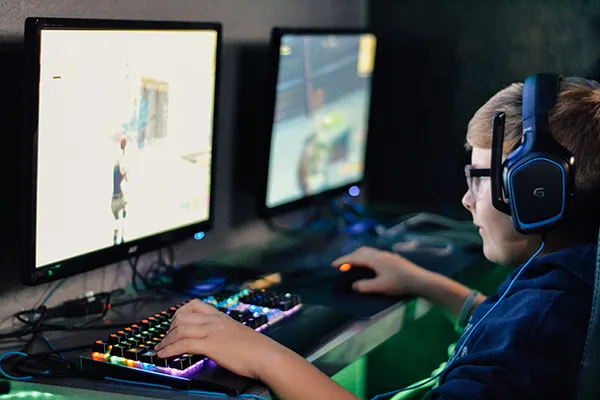
It’s no secret that kids love video games. Around 618 million players are aged under 18, accounting for around 20% of the overall gaming community. Historically, video games have received a bad rap as being an unwanted distraction in children’s lives. For years, we’ve been inundated with countless news articles and research papers linking video games to violent outbursts and undesirable behavior. However, there’s increasing evidence to suggest that the right kind of games can actually encourage learning and promote better skills development. Games can aid hand-eye coordination, enforce the core principles of teamwork, and help younger children develop fine motor skills.

How Video Games Are Being Used in School
When we refer to video games being used in the classroom, we’re not talking about the latest driving simulator or brawler being brought into play. Instead, it’s games designed exclusively for the educational sector that have the most exciting learning applications.
Nonetheless, video games have an irresistible appeal to children. Even the most mundane learning game is going to tempt a reluctant learner, with educational games having been around since the late 1960s. Today, it’s online learning avenues that are the most accessible. Online learning portals like Turtle Diary and Educaplay offer a vast library of titles that can help youngsters master literacy, nail numeracy, and fine-tune their problem-solving abilities.
While video games have useful applications for early learning environments, they’re also a firm fixture of high schools and college campuses. In high schools across the USA and beyond, esports leagues are now a staple, helping students socialize and offering aspiring esports athletes a pathway to success. They’re also popular at the college level. Once considered something of a novelty, esports scholarships are now incredibly common. In the United Kingdom, institutions like the University of Roehampton offer multiple esports scholarships every year. They’re more commonplace in the United States, with Hawaii Pacific, Bellevue, and Ohio State all offering full scholarships.
So, Games Aren’t All Bad?
Although some detractors are still hammering home the idea that all video games are bad, there’s little science to actually suggest gaming has any negative consequences for kids. Ultimately, it’s down to parents to use their best judgment when introducing children to video game content.
Fortunately, parental advisory guidelines and content warning ratings make it easy to steer kids away from potentially harmful material. Arguably, it’s the amount of time children spend playing games that is more detrimental to their health and development than anything else. Any parent knows the dangers of too much screen time, and an addictive platformer or battle royale can encourage kids to spend too many hours glued to a keyboard or joystick. Setting limits and encouraging a healthier relationship with video game consoles and computers is the way to go.
Gaming Career Prospects
In 2024, the market size of the video game industry is expected to grow to more than $189 million. It’s one of the most lucrative entertainment industries around, with plenty of opportunities for adolescents eyeing a career in the sector.
There are countless high-paying roles behind the scenes, from video game developer to scriptwriter. Even at entry-level, respectable salaries and generous benefits come as a standard. Then there’s esports. Those with an innate talent for Counter-Strike or League of Legends can turn their passion for video games into a well-paying career.
You only have to look at the LCS schedule at 1337PRO.com to see how seriously competitive gaming is taken. Esports events bring in online audiences of more than half a billion every year, with some tournaments offering eight-figure prize pools. While the careers of esports players might be brief, they can prove incredibly profitable. At the highest level, esports athletes can comfortably become millionaires during their careers if their teams reach the top spot and claim the biggest prize pools.
It’s understandable why many parents and educators are resistant to the idea of video games in the classroom. However, it’s been proven time and again that the right titles can transform a child’s learning experience, helping them meet their developmental milestones earlier. What’s more, an early introduction to video games can lead to a lifelong passion that can evolve into gainful employment. With the video game industry and esports sector offering so many profitable prospects, an interest in gaming is definitely worth encouraging.